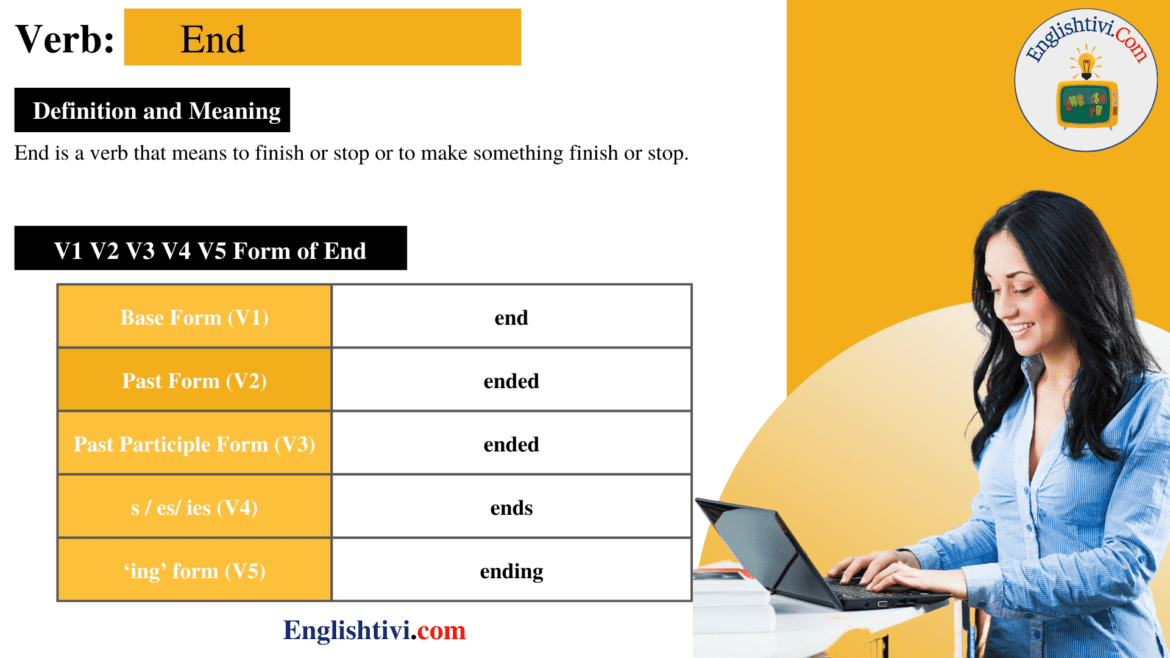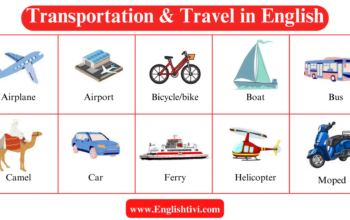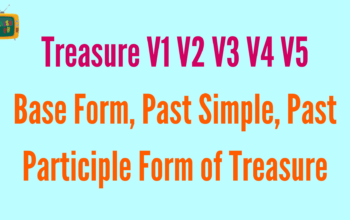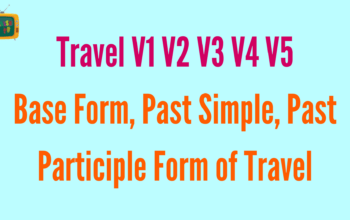Let’s find out with English tivi in the article below.
⏩ Sign Up to Get Bonus
See more at: Verbs
End of Definition and Meaning
End is a verb that means to finish or stop or to make something finish or stop.
V1 V2 V3 V4 V5 Form of end
| Base Form (V1) | end |
| Past Form (V2) | ended |
| Past Participle Form (V3) | ended |
| s / es/ es (V4) | ends |
| ‘ing’ form (V5) | ending |
End of Past Simple V2
The verb end is also employed in its V2 form as “ended”. It is used to indicate the past tense in sentences.
End of Past Participle V3
This verb’s V3 form is “ended ‘. In the case of past perfect tense or present perfect tense, the word “ended is used.
+ In the present perfect tense, the word end is used ‘have +’ended’ or ‘has +’ended.’
- I, you, and we are used as ‘have + ‘ended ‘ subjects.
- He, she, and it are used as ‘has +’ended’ subjects.
+ If you need to use the past perfect tense, use ‘had +’ended‘ regardless of the subject.
You might also like: ALL the English Grammar Basics You Need
Conjugation of End V1 V2 V3 V4 V5
| Conjugation table: End | |||
| Number | Singular | ||
| Present Simple of end | I | You | She/He/It |
| end | end | ends | |
| Plural | |||
| We | You | They | |
| end | end | end | |
| Present Continuous of end | I | You | She/He/It |
| am ending | are ending | is ending | |
| Plural | |||
| We | You | They | |
| are ending | are ending | are ending | |
| Present Perfect of end | I | You | She/He/It |
| have ended | have ended | has ended | |
| Plural | |||
| We | You | They | |
| have ended | have ended | have ended | |
| Present Perfect Continuous of end | I | You | She/He/It |
| have been ending | have been ending | has been ending | |
| Plural | |||
| We | You | They | |
| have been ending | have been ending | have been ending | |
| Past Simple of end | I | You | She/He/It |
| ended | ended | ended | |
| Plural | |||
| We | You | They | |
| ended | ended | ended | |
| Past Continuous of end | I | You | She/He/It |
| was ending | were ending | was ending | |
| Plural | |||
| We | You | They | |
| were ending | were ending | were ending | |
| Past Perfect of end | I | You | She/He/It |
| had ended | had ended | had ended | |
| Plural | |||
| We | You | They | |
| had ended | had ended | had ended | |
| Past Perfect Continuous of end | I | You | She/He/It |
| had been ending | had been ending | had been ending | |
| Plural | |||
| We | You | They | |
| had been ending | had been ending | had been ending | |
| Future Simple of end | I | You | She/He/It |
| will/shall end | will/shall end | will/shall end | |
| Plural | |||
| We | You | They | |
| will/shall end | will/shall end | will/shall end | |
| Future Continuous of end | I | You | She/He/It |
| will/shall be ending | will/shall be ending | will/shall be ending | |
| Plural | |||
| We | You | They | |
| will/shall be ending | will/shall be ending | will/shall be ending | |
| Future Perfect of end | I | You | She/He/It |
| will/shall have ended | will/shall have ended | will/shall have ended | |
| Plural | |||
| We | You | They | |
| will/shall have ended | will/shall have ended | will/shall have ended | |
| Future Perfect Continuous of end | I | You | She/He/It |
| will/shall have been ending | will/shall have been ending | will/shall have been ending | |
| Plural | |||
| We | You | They | |
| will/shall have been ending | will/shall have been ending | will/shall have been ending | |
| Conditional Present of end | I | You | She/He/It |
| would end | would end | would end | |
| Plural | |||
| We | You | They | |
| would end | would end | would end | |
| Conditional Perfect of end | I | You | She/He/It |
| would have ended | would have ended | would have ended | |
| Plural | |||
| We | You | They | |
| would have ended | would have ended | would have ended | |
| Conditional Present Continuous of end | I | You | She/He/It |
| would be ending | would be ending | would be ending | |
| Plural | |||
| We | You | They | |
| would be ending | would be ending | would be ending | |
| Conditional Perfect Continuous of end | I | You | She/He/It |
| would have been ending | would have been ending | would have been ending | |
| Plural | |||
| We | You | They | |
| would have been ending | would have been ending | would have been ending | |
| Present Subjunctive of end | I | You | She/He/It |
| end | end | end | |
| Plural | |||
| We | You | They | |
| end | end | end | |
| Past Subjunctive of end | I | You | She/He/It |
| ended | ended | ended | |
| Plural | |||
| We | You | They | |
| ended | ended | ended | |
| Past Perfect Subjunctive of end | I | You | She/He/It |
| had ended | had ended | had ended | |
| Plural | |||
| We | You | They | |
| had ended | had ended | had ended | |
| Imperative of end | I | You | She/He/It |
| end | |||
| Plural | |||
| We | You | They | |
| Let’s end | end | ||
See more at: Vocabulary
Example Sentences with End V1 V2 V3 V4 V5
In this section, we will learn about end sentence examples:
- This meeting will end at 10 o'clock
- The game ended at 20 minutes
- We have ended the discussion
- His resignation ends months of speculation about his future.
- We're ending a game
Synonym Words For End
Synonym of end word list. Here are a variety of words whose meaning is nearly the synonym of end:
- conclude
- finish
- close
- culminate
- terminate
- cease
- climax
- stop
- settle
- build up to
- close out
- lead up to
- wind up
- wrap up
- reach
- a finale
- round off
- round out
- bring to
- a close
- come to a head
Opposite Words For End
The antonym of end word list. Here are some words that have nearly the opposite meaning as end:
- continue
- persevere
- persist
- keep up
- perpetuate
- carry on
- press on
- proceed
- push on
- sustain
- drag on
- endure
- go on
- hold
- hold on
- hold up
- keep going
- keep on
- not give up
You might also like: Best List of Irregular Verbs in English
Some Frequently Asked Questions About End (Verb)
What is the V1 V2 V3 V4 V5 of end?
The past tense of end is ended. The third-person singular simple present indicative form of end is ends. The present participle of end is ending. The past participle of end is ended.
| Base Form (V1) | end |
| Past Form (V2) | ended |
| Past Participle Form (V3) | ended |
| s / es/ ies (V4) | ends |
| ‘ing’ form (V5) | ending |
What is the V2 and V3 form of end?
+ The V2 and V3 form of end is “ended “ and “ended”.
What is the sentence of end?
What is the past tense V2 of end?
+ The past tense of end is “ended”.
What is the past tense V3 of end?
+ The past participle of end is “ended “.
What is the present participle V5 of end?
+ The present participle of end is “ending”.
Conclusion
Let’s learn with English TV the structure of the verb End V1 V2 V3 V4 V5: Base Form, Past Simple, Present Continuous and Present Continuous and Present Continuous and Present Continuous forms. We wish you all the best of luck.





